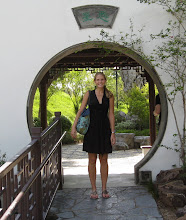Sunday, October 18, 2009
Where is home?
Friday, October 09, 2009
The measure of a quality city?



 On Thursdays here in Hong Kong I do not have class. I often spend these weekdays exploring different areas of of the Island, Kowloon and the New territories. Having this "free" weekday is a sort of luxury because the parks and attractions around the city are not as crowded as during the weekend. It is on these days that I put down the human rights reading, stop trying to come to my own conclusions about the world, and explore the world for what it is.
On Thursdays here in Hong Kong I do not have class. I often spend these weekdays exploring different areas of of the Island, Kowloon and the New territories. Having this "free" weekday is a sort of luxury because the parks and attractions around the city are not as crowded as during the weekend. It is on these days that I put down the human rights reading, stop trying to come to my own conclusions about the world, and explore the world for what it is.Wednesday, October 07, 2009
Universal human rights or regional human rights ... acceptable contradictions?
Are human rights universal???
I came to Hong Kong this fall to learn more about human rights. To me, talking about human rights has always been an exercise in passion, me believing that since no person was chosen to be born, that therefore each person has some sort of inherent protective rights. While many of my fellow colleagues came here with strong notions of their beliefs of human rights, I am still finding my way. In a field riddled with contradictions and being a subject that pulls on the heartstrings of most, I am trying to make sense of this subject of human rights.
There are many arguments that human rights are purely western constructs, that human rights are used by the north to control and admonish the south, that countries like the United States are “above human rights”. It is true that the Universal Declaration of Human Rights, which is the foundation of much of international customary law and the impetus for subsequent UN Conventions was created in the wake of World War II and largely out of a fear of what Western nations might do to each other again in the future, but does that make it only applicable to the west? China’s P.C. Chang was very instrumental in the document’s drafting. But say for a moment that the Western notion of the UDHR holds water, then must we believe that human rights are really a regional set of beliefs, that each region of the world should have different rights? If that is true, then there is no universality of human rights at all. But then, is regionalism good enough? After all, technically Asia consists of the majority of Russia, the Middle East and China, India and Southeast Asian nations. Can a “regional” set of human rights really encapsulate all major world religions found in Asia as well as Russia ….? And if that answer is yes, then arguably that’s a point for the universality of rights and not for regionalism.
While I learn more and more on a daily basis, I am still yet unsure how to ultimately weigh all of this knowledge. I think my curse is that I can see both sides of the human rights issues. I see the contradictions, I recognize the weakness of some ECHR cases whereby the rationale is deemed to be based upon self-evident truths rather than historical legal maxims, I can detect frustration with the south being bullied by the north through means of human rights, and yet at the end of each day I come back to the notion, perhaps a naïve one, that every person matters. No person chose to come into this world and in that sense we are all equal, not matter what we produce or do not produce, no matter if we live under a tyrannical dictator or in a free society (which some would also consider a tyrannical prospect). In that sense, if we are all equal, should we not be equally protected? But then does equal protection require regional sensitivities? You see, I come full circle and cannot decide if regionalism flies in the face of a belief of the universality of human rights.
Hopefully my beliefs will crystallise in the not too distant future, or I will decide that the contradictions are not fatal.

